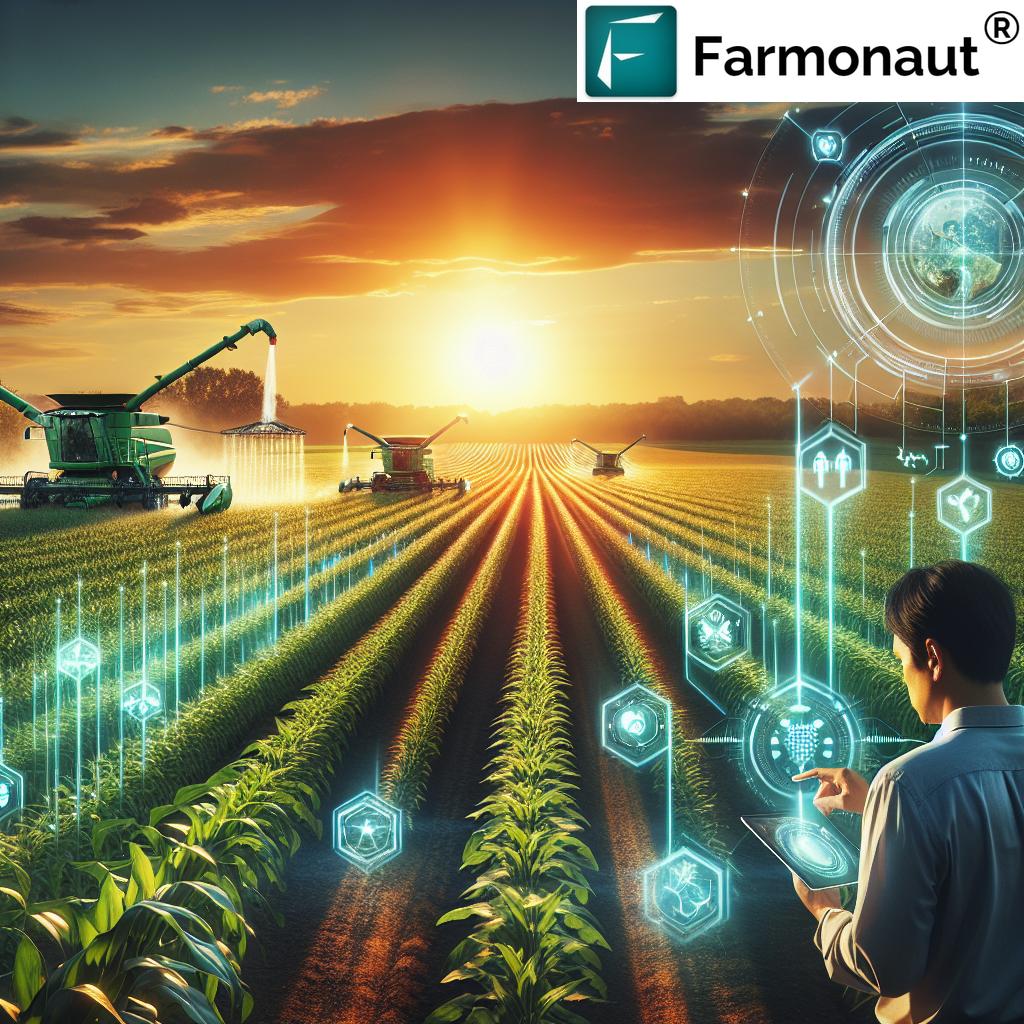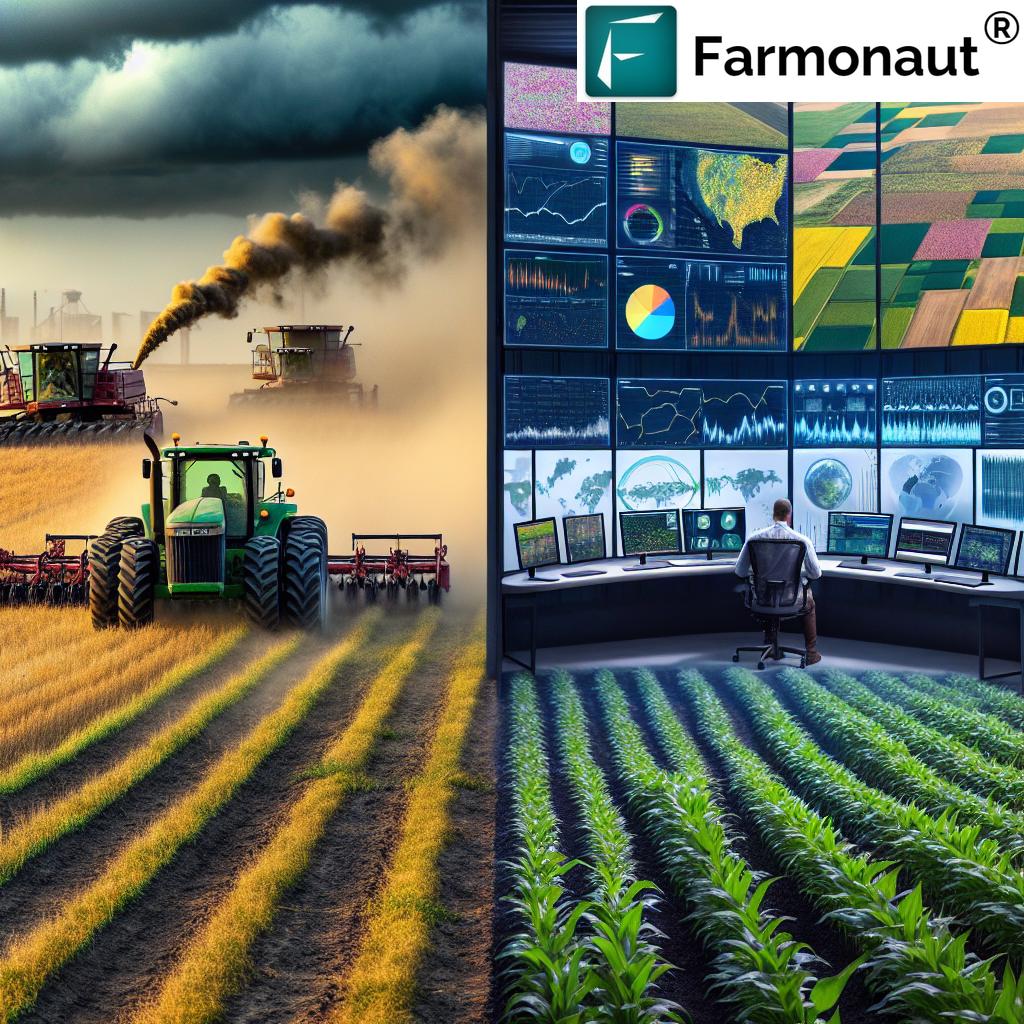Unlocking Farm Potential: Illinois Ag Tech Innovations Boost Crop Yields and Sustainability

“Illinois farmers using precision agriculture technology have seen up to 20% increase in crop yields over traditional methods.”
Welcome to the cutting edge of agricultural innovation! At Farmonaut, we’re excited to explore the latest advancements in ag tech that are revolutionizing farming practices in Illinois and beyond. As we delve into the world of precision agriculture and digital farming platforms, we’ll uncover how these technologies are not only boosting crop yields but also promoting sustainable farming practices.
In this comprehensive blog post, we’ll explore how Illinois farmers are leveraging farm data analytics, advanced weed control strategies, and weather-resilient crop production techniques to optimize their operations. We’ll also discuss the impact of these innovations on key crops like corn and soybeans, and how they’re shaping the future of agriculture in the Midwest.
The Rise of Precision Agriculture in Illinois
Precision agriculture technology has become a game-changer for Illinois farmers. By utilizing satellite imagery, GPS-guided machinery, and sophisticated data analysis, farmers can now make more informed decisions about planting, fertilizing, and harvesting their crops. Here’s how precision ag is transforming the Prairie State’s farms:
- Targeted Resource Application: Using detailed field maps and soil analysis, farmers can apply fertilizers and pesticides precisely where they’re needed, reducing waste and environmental impact.
- Variable Rate Seeding: Planting densities can be adjusted based on soil conditions, maximizing yield potential across different areas of a field.
- Real-time Crop Monitoring: Satellite and drone imagery provide up-to-date information on crop health, allowing for rapid response to issues like pest infestations or nutrient deficiencies.
At Farmonaut, we’re proud to offer cutting-edge farm data analytics through our digital farming platform. Our satellite-based crop health monitoring system provides real-time insights that help farmers make data-driven decisions to optimize their yields and resource use.
Innovative Crop Management Solutions
The agricultural landscape in Illinois is evolving rapidly, with new crop management solutions emerging to address persistent challenges. Let’s explore some of the most impactful innovations:
Advanced Weed Control Strategies
“Advanced weed control strategies implemented through digital farming platforms can reduce herbicide use by up to 90% in some cases.”
Weed management has long been a critical issue for Illinois farmers. However, new technologies are providing more efficient and environmentally friendly solutions:
- AI-Powered Weed Recognition: Machine learning algorithms can identify weed species in real-time, allowing for targeted treatment.
- Precision Spraying: Robotic sprayers can apply herbicides directly to weeds, dramatically reducing chemical use.
- Cover Crop Management: Digital tools help farmers optimize cover crop strategies to suppress weeds naturally.
These advancements not only improve crop yields but also contribute to more sustainable farming practices by reducing the overall use of chemicals in agriculture.
Weather-Resilient Crop Production
Illinois farmers face increasingly unpredictable weather patterns due to climate change. To combat this, weather-resilient crop production strategies are being developed and implemented:
- Drought-Tolerant Varieties: New corn and soybean varieties bred to withstand periods of low rainfall.
- Smart Irrigation Systems: AI-controlled irrigation that adjusts water usage based on real-time weather data and soil moisture levels.
- Seasonal Forecasting Tools: Advanced weather modeling helps farmers plan for long-term climate trends.
At Farmonaut, we integrate weather data with our satellite imagery to provide farmers with comprehensive insights for weather-resilient crop management. Our platform helps farmers anticipate and adapt to changing weather conditions, ensuring more stable yields year after year.
Farm Productivity Optimization Techniques
Maximizing farm productivity is crucial for the success of Illinois agriculture. Here are some cutting-edge techniques being employed:
- IoT Sensors: Connected devices monitor soil conditions, equipment performance, and crop health in real-time.
- Automated Machinery: Self-driving tractors and harvesting equipment increase efficiency and reduce labor costs.
- Data-Driven Crop Rotation: Analytics platforms suggest optimal crop rotations based on market trends and soil health data.
These technologies work together to create a more efficient and productive farming ecosystem. By leveraging farm data analytics, Illinois farmers can make informed decisions that boost their bottom line while promoting sustainable practices.
Explore Farmonaut’s API for advanced farm data analytics
Agtech for Yield Improvement
Improving crop yields is a constant goal for Illinois farmers, and agtech is providing new tools to achieve this:
- Genetic Engineering: Development of crops with enhanced traits for pest resistance and nutrient efficiency.
- Precision Planting: High-tech planters that ensure optimal seed spacing and depth for maximum yield potential.
- Nutrient Management Systems: Software that analyzes soil samples and crop needs to create tailored fertilization plans.
These innovations are helping Illinois farmers push the boundaries of what’s possible in terms of crop yields, ensuring that the state remains a leader in agricultural production.

Sustainable Farming Practices in Illinois
Sustainability is no longer just a buzzword in Illinois agriculture; it’s becoming a core principle guiding farming practices. Here’s how agtech is supporting sustainable farming:
- Precision Nutrient Management: Reducing fertilizer runoff and protecting water quality.
- Conservation Tillage: Using technology to implement no-till or reduced-till practices that preserve soil health.
- Biodiversity Mapping: Using satellite data to identify and protect areas of high ecological value on farmland.
At Farmonaut, we’re committed to supporting sustainable agriculture. Our platform provides tools for efficient resource management and environmental monitoring, helping farmers balance productivity with conservation.
Access Farmonaut’s API Developer Docs for sustainable farming solutions
The Impact of Digital Farming Platforms
Digital farming platforms are revolutionizing how Illinois farmers manage their operations. These comprehensive tools integrate various aspects of farm management into a single, user-friendly interface. Here’s how they’re making a difference:
- Centralized Data Management: All farm data, from yield maps to equipment maintenance logs, in one place.
- Real-time Decision Support: AI-powered recommendations for planting, spraying, and harvesting based on current conditions.
- Market Integration: Direct connections to commodity markets for better-informed selling decisions.
Farmonaut’s digital farming platform offers these features and more, providing Illinois farmers with a powerful tool to streamline their operations and boost profitability.
Navigating Challenging Growing Seasons
Illinois farmers often face difficult growing seasons due to weather extremes or pest pressures. Agtech is providing new tools to help navigate these challenges:
- Early Warning Systems: Satellite and ground-based sensors detect potential issues before they become serious problems.
- Climate-Smart Crop Selection: Data-driven tools help farmers choose crops and varieties best suited to predicted seasonal conditions.
- Integrated Pest Management (IPM): Digital platforms coordinate pest monitoring and targeted interventions across multiple farms.
By leveraging these technologies, Illinois farmers can better prepare for and respond to the unpredictable nature of agriculture, ensuring more consistent yields even in challenging years.
The Future of Illinois Agriculture
As we look to the future, several emerging trends are set to shape Illinois agriculture:
- Blockchain for Traceability: Ensuring transparency and food safety throughout the supply chain.
- Vertical Farming: Urban agriculture technologies that could complement traditional farming.
- Robotics and Automation: Further reducing labor costs and increasing precision in farm operations.
- Carbon Markets: New opportunities for farmers to generate income through sustainable practices.
These innovations promise to keep Illinois at the forefront of agricultural progress, balancing productivity with sustainability for generations to come.
Illinois Ag Tech Innovations Impact Matrix
| Ag Tech Innovation | Crop Yield Impact | Sustainability Impact | Adoption Rate |
|---|---|---|---|
| Precision Farming Tools | High | High | 65% |
| Advanced Crop Sensors | Medium | Medium | 40% |
| AI-driven Planting Strategies | High | Medium | 30% |
| Smart Irrigation Systems | Medium | High | 35% |
| Drone-based Crop Monitoring | Medium | Low | 25% |
Conclusion: Embracing the Ag Tech Revolution
The agricultural landscape in Illinois is undergoing a profound transformation, driven by innovative technologies and data-driven approaches. From precision agriculture and advanced weed control to weather-resilient crop production and sustainable farming practices, the opportunities for growth and improvement are vast.
At Farmonaut, we’re committed to being at the forefront of this agricultural revolution. Our digital farming platform, powered by satellite technology and AI, provides Illinois farmers with the tools they need to make informed decisions, optimize their operations, and adapt to changing conditions.
As we move forward, the integration of these ag tech innovations will be crucial for maintaining Illinois’s position as a leader in agricultural production. By embracing these technologies, farmers can not only increase their yields and profitability but also contribute to a more sustainable and resilient food system for the future.
Farmonaut Subscriptions
Frequently Asked Questions
Q: How does precision agriculture technology improve crop yields?
A: Precision agriculture uses data from satellites, sensors, and other sources to provide detailed information about field conditions. This allows farmers to apply inputs like water, fertilizer, and pesticides more efficiently, targeting specific areas that need attention. As a result, crops receive optimal care, leading to improved yields and reduced waste.
Q: What are some examples of sustainable farming practices supported by ag tech?
A: Ag tech supports sustainable farming through various means, including precision nutrient management to reduce runoff, conservation tillage practices that preserve soil health, and smart irrigation systems that optimize water use. Additionally, technologies like AI-powered weed recognition can significantly reduce herbicide use.
Q: How can digital farming platforms help Illinois farmers make better decisions?
A: Digital farming platforms integrate various data sources, including weather forecasts, market prices, and field-level crop health information. This comprehensive view allows farmers to make more informed decisions about planting, harvesting, and selling their crops. These platforms often include AI-powered recommendations to further assist in decision-making.
Q: What role does satellite technology play in modern farming?
A: Satellite technology provides farmers with regular, high-resolution imagery of their fields. This allows for monitoring crop health, detecting issues like pest infestations or nutrient deficiencies early, and tracking crop growth over time. Satellite data is also crucial for creating precise field maps used in variable rate applications of inputs.
Q: How are Illinois farmers adapting to climate change using ag tech?
A: Illinois farmers are using ag tech to adapt to climate change in several ways. This includes implementing weather-resilient crop production strategies, using advanced weather forecasting tools for better planning, and adopting drought-tolerant crop varieties. Digital platforms also help farmers track long-term climate trends to inform their crop selection and management practices.






